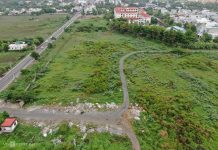
Thap Thap Di Da is located 30 km north of coastal town Quy Nhon, Binh Dinh’s capital. The pagoda was built in 1683 during the Le Dynasty era and originally known as Chanh Hoa. In 1691 King Le Hien Tong renamed it Thap Thap Di Da.

The gate of the pagoda is built of bricks made by Cham ethnic people and roofed with yin and yang tiles, and has two layers of surrounding walls.

At the sanctum entrance are long sentences written in Chinese characters, carved on wood and painted in gold.

In the main area, the main structure is made of wood and carved with sophisticated and elaborate lotuses, dragons and stylized phoenixes along with more old writing.

The main part of the pagoda consists of the hall, the West and East areas with a large corridor connecting them with a large yard paved with square tiles and diverse kinds of ornamental plants.

In addition to the main structures, there are also 24 large and small stupas in various architectural forms.

The main gate of a stupa.

In each stupa are statues of majestically shaped beasts.

A stupa in the northeast of the pagoda.

The pagoda retains a famous white stone. Legend has it that the Nguyen Dynasty (1802-1945) executioner used to behead people on this stone. The stone is next to a 300-year-old tree by the south of the pagoda wall and dubbed ‘the slashing stone’.

The pagoda entrance is shaded by an ancient bodhi tree. In summer the lotus pond in front of the pagoda is filled with flowers that give off fragrance.
Thap Thap Di Da is one of the most ancient pagodas in central Vietnam. It has been named by the Ministry of Culture, Sports and Tourism as “a national cultural and historical site”. The pagoda has undergone four renovations so far.
























